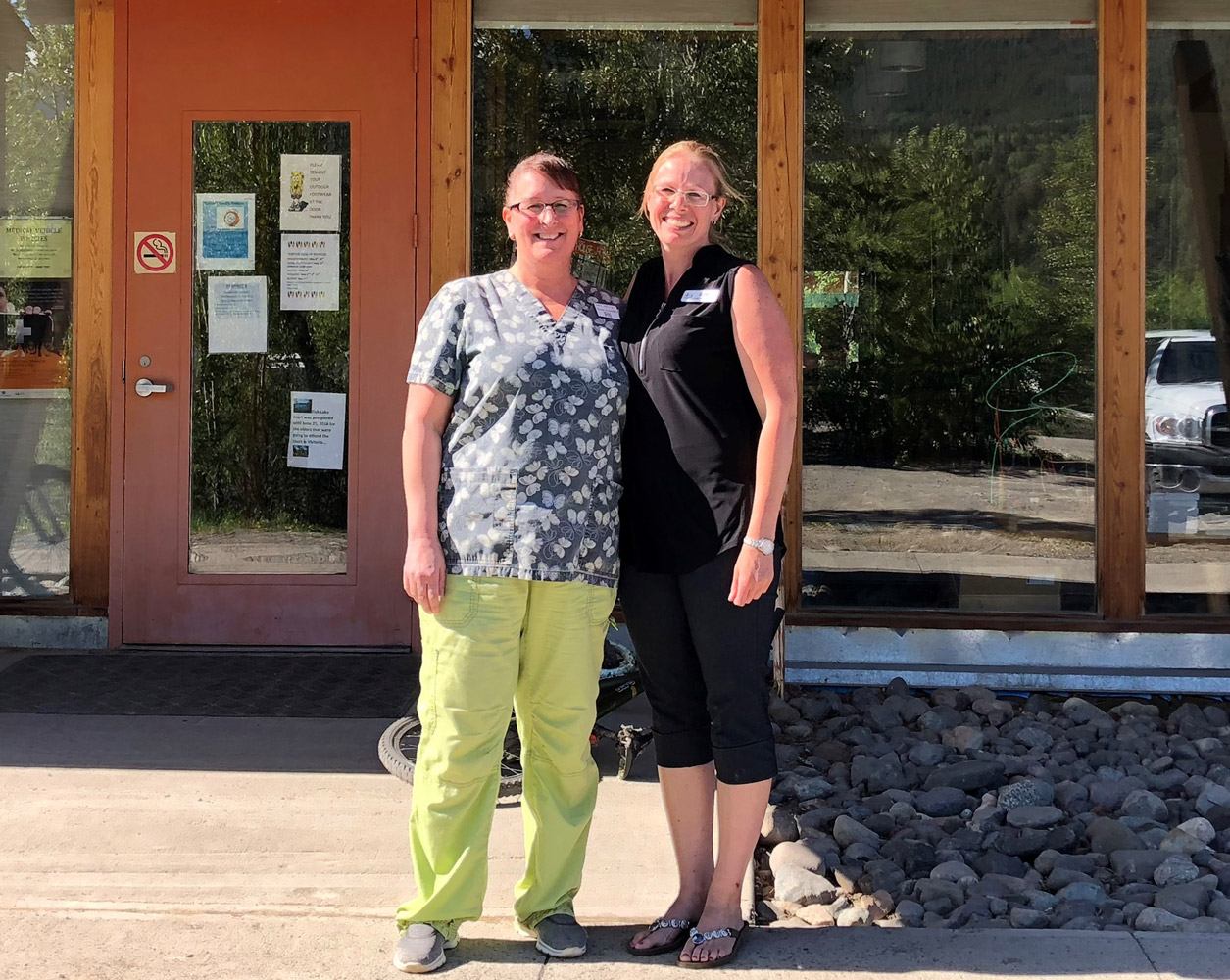
Wanda Charleyboy (left) and Kim Ramier (right)
A renovation project goes wrong and a window falls on an unfortunate worker. Bleeding profusely from multiple cuts to his head, he seeks emergency medical help. Only this is in Xeni Gwet'in, about a three-hour drive southwest of the nearest hospital in Williams Lake. The man goes to the local health centre where Community Health Nurse Wanda Charleyboy has just welcomed Kim Ramier, an Emergency Department nurse from Williams Lake. Kim and Wanda had been matched for a new exchange program that has Emergency Department nurses from Interior Health spending a day with counterparts who work in remote First Nation communities. There – not half an hour after Kim arrived – she joins Wanda in treating the wounded man.
"I was so thankful to have Kim there – she was a calming influence," said Wanda. "At the same time, it was an eye-opener for her about the kind of events we experience that we're not really set up for. We don't have the drugs or many of the supplies an emergency department would have even though we regularly have to deal with these kind of events."
It was a fast track toward the goal of the exchange program, which is for emergency and community nurses to better understand each other's roles in order to improve relationships with and services offered to First Nations clients. The project came out of the Cultural Safety Task Force formed by the First Nations Health Authority, Interior Health, and local First Nations following a Cultural Safety and Humility Forum held in Soda Creek in May 2017.
Task Force member Connie Jasper, Health Manager for the Tsilhqot'in Nation, suggested the exchange project. "The best learning experiences happen in the communities themselves," she said. "Interior Health was immediately supportive of the idea."
So far, six Emergency Department Nurses from Interior Health have participated in the program, visiting remote health clinics with Wanda, Connie or Dãkelh Dené Health Services Manager Jamie Tanis.
Jamie recounts taking Emergency Department Nurse Sarah Mason out, leaving early to look for bears en route to Ulkatcho, which is about a three-hour drive west of Williams Lake.
"Sarah had come from Alberta and had never had an opportunity in three years to go west of Williams Lake. It was an opportunity for her to see the nursing stations and understand things like why people wouldn't necessarily call an ambulance, given these distances."
A community member had passed away shortly before Sarah's visit and so she and Jamie went to the community dinner and helped serve food. An Elder taught Sarah how to say "thank you" in the Carrier language and she also got to speak with a man she had treated multiple times in Emergency.
"It struck me that although I had had many interactions with this patient, I in truth knew nothing about him," Sarah later wrote about that conversation. "His story was wrought with tragedy, which led me to have a newfound empathy. I will try in the future to always keep in mind that I may not know the full extent of a patient's experiences, therefore an open-minded and a respectful and empathetic approach should always be utilized with every interaction."
The Emergency Department Nurses learned first-hand about the many factors that differentiate urban and rural life. For instance, Carrier, Chilcotin or Shuswap is the first language for some of the Elders in the region, many homes are off the grid, cell phone service disappears 10 minutes outside Williams Lake and even the health clinics only have satellite Internet service – if the generator is working. The beauty and grandeur of the geography made a deep impression – as did the remoteness of the various communities, underscoring the fact that it can be very difficult to make the journey to town for any type of appointments or supplies.
Both Jamie and Wanda praised the open-minded attitude of their Emergency Department counterparts.
"Kim had an open mind and an open heart and really wanted to gain understanding," said Wanda.
The Emergency nurses in turn praised their community counterparts for helping introduce them to the culture and history and current circumstances of the local First Nations.
"Wanda enlightened me on the cultural history of the community and the personal experiences she has had with providing care through the veil of fear which still exists for many individuals due to residential school exposure," said Kim. "The residential school history has been covered but [there's] not enough education on the cultural aspect to provide holistic care. Nevertheless, I have shared my new knowledge with colleagues and feel more confident in my ability to provide culturally safe care."
The exchange program will continue this year with the Community Health Nurses spending a day in the Emergency Department at Cariboo Memorial Hospital.
"It's a privilege to work with the team to break down the barriers to communication," said Jamie.
Wanda says her experience with the exchange program has given her hope that attitudes in health care are starting to shift.
"It was an honor to be able to share our story, our journey. It was a gift to share with someone who was willing to learn. My hope is this is the beginning of change. With being able to walk in each other's shoes we can be supportive of one another so we provide the best care we can to our patients."

